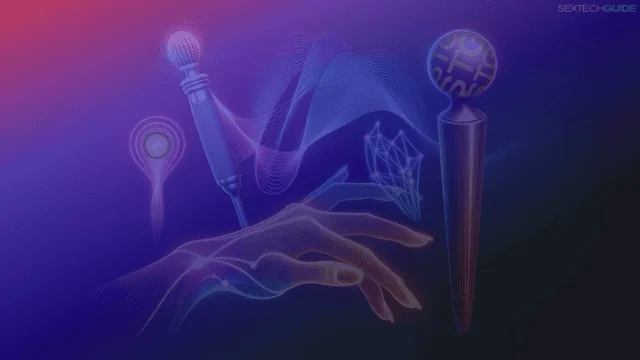The sex lives of people with disabilities, in particular for those who are visually impaired, are often misunderstood, and surrounded by harmful stereotypes. Contrary to the belief that disabled individuals lead unfulfilling sex lives, many have rich and diverse sexual experiences.
In this article, we’ll explore the myths and barriers that blind people face when it comes to their sexual wellbeing, along with how innovative sextech can be used to enhance intimacy and overcome these blocks, and finally take into consideration just how far we need to go to revolutionize this industry.
Dispelling ableist myths
A by-product of stereotyping is a misunderstanding of the sexual needs for this marginalized group. Blind people are victims of these ignorant beliefs but there have been attempts at salvaging the relationship blind people have with sex.
According to CJ DeBarra, author and trainer at Enhance the UK, an organization dedicated to changing the way the world views disabled people, the greatest stereotype disabled people face echoes the belief “that disabled people don’t want to have or like sex!”
They go on to say that, “it’s the biggest misconception of all. Sex is important. We all want to be loved, we all crave a bit of intimacy from time to time and like it not, we are sexual beings. This belief that disabled people don’t want to have sex can create other problems too. Targeted relationships and sex education for young disabled people is practically non-existent.”
Highlighting sexual barriers
Condom difficulties
Research has procured more in-depth understandings of blind people’s needs during sexual experiences. For example, they may have difficulty with condoms, leaving them vulnerable when it comes to caring for one’s sexual health.
Condom designs can be complicated, and for blind people, extra effort is required to access the technology. The protective devices are often designed without disabled people in mind, and it can often take longer or become impossible to use.
Absence from sex education
Blind people are overlooked in spheres of sexual health. Sex education is inaccessible to blind people on a consistent basis, and resources are minimal.
Comprehensive sex education has proven to reduce risky sexual behavior. About 50 of 100 new STIs are found in young people aged 15 to 25, and sex education can ensure people are aware of how to practice safe sex. To further prove the benefits of sex education, teen pregnancy rates are at an all time low.
Blind people can and do have active sex lives, and need to be included in sex education to ensure healthy sex practices.
Sensory barriers
Sensory issues can also arise. Blind people may require a more descriptive experience, and want a more detailed portrayal of their sex partner.
According to Damian Weatherald, a member of the advisory group for Split Banana, an organization that provides innovative relationship and sex education programmes, “Disabled people can have amazing sex lives and, in some ways, better sex than those who are not disabled because there have to be more conversations and considerations.”
As blind people are missing visual sensory experiences, alternative and creative ideas are needed.
Sex tech innovations
All three of the above mentioned issues in the sex lives of blind people have encouraged innovation.
Condom innovations
Condom designs are not static, and new designs can prevent STIs and teenage pregnancy and encourage a freeing experience of sexual intercourse. This assistive technology has been developed for both AFAB and AMAB individuals.
A condom, created with the molding of a penile prosthesis, and training of male condom placement on this prosthesis helped blind men understand the anatomy of the condom. The clay utilized helped developers understand the personalized experience with condom helps blind people in their condom usage.
A similar device has been developed for AFAB individuals. A new AFAB condom with the modification of the vaginal canal by adding representation of the cervix, which includes materials such as paper and plastic.
The technological evolution for disabled people stresses the importance of clear instructions. Condom development for blind people included detailed explanations of the technology. This allows blind people autonomy and independence in performing sexual acts.
Rather than relying on others, including sex partners, to explain condom usage, the instructions and new devices help equalize the sexual experience and /inspire autonomy around consent.
AI market research
The personalized experiences and real life voices of disabled people can help to facilitate innovation.
When asked how to improve sex tech for disabled people, DeBarra emphasizes that “by making disabled people part of the conversation when you are developing your sex tech. While AI can be a wonderful tool for disabled people to explore their sexuality, first you need to discover if we can actually use it in the first place.”
DeBarra says, “this means factoring in workshops, focus groups, consultants, or access audits where professionals are paid to test your app or contribute to your designs. People with lived experience of disability will be able to see things in a design or want certain additions that you may not have thought of.”
AI can create an enlightening and stimulating experience for blind people. It can fill in gaps where they are missing.
Ask Envision, which utilizes OPEN AI GPT-4 and can provide details of objects around them. This could help create a more stimulating sex life for the visually impaired as the technology can describe the person, sex objects, etc in visual detail is ahead of the game in sex technology.
Smart sex tech
Nevertheless, there are already sex tech companies geared towards the sexual health and pleasure of disabled people.
Kelly Gordon, of Hot Octopuss, tailored sex toys to the needs of disabled people. Hot Octopuss uses technology and science to push boundaries. The technology considers caregivers and it considers those with difficulties using arms and hands.
The devices can be operated with wrist-strap remotes. The technology also considers pain and people who can’t perform non-penetrative sex.
“We truly believe at Hot Octopuss that pleasure should be for everyone and everybody and that means that sex tech should be accessible for all. Accessibility and accessible practices are often easy to implement and accessible design helps everyone whether they are disabled or non-disabled. If brands are thinking of all consumers within the design process from the beginning then products and services then automatically become more accessible,” says Gordon.
Sex toys can provide stimulation and develop a healthy relationship with sex and your body. It can increase confidence, increase libido and encourage self-love.
The phenomenon of the ‘orgasm gap’, has meant that women in heterosexual relationships find difficulty in reaching orgasm during sex. Yet, when using vibrators, 90 percent of women climax compared to 65 percent of the time when having sex with men.
Sex toys play a huge role in showing women and AFAB the possibilities during sex. Disabled people also deserve to receive fulfilling pleasure by incorporating vibrators that are accessible for them, as well as innovations for educating people around the body and pleasure such as Sex-Ed+‘s accessible materials.
Audio-based innovations
Sounds and listening are necessary for enhancing the overall sexual experience. For solo-pleasure, there is audio-based porn for blind people to explore their sexuality and reign in confidence.
Audio porn apps are growing in popularity, and even Pornhub also launched its narrated videos for people that are visually impaired back in 2016.
However there is room for improvement when it comes to voice and sound technology. The voices are not always arousing and it can become an awkward experience.
The future of sex tech for blind people
The future of sex technology will not exist without disabled people. But the birth of an inclusive sexual revolution will not be without challenges.
Damian touches on these unique difficulties. He shares that “the biggest challenge is going to be showing the sex tech industry that it is worth investing in making accessible products, and to see the potential for growth in entering the accessible product market. For far too long the disabled market has been largely ignored by the sex tech industry and this needs to change.”
AI is going to be a strong influence on the sex lives of disabled people. Damian embraces the idea of AI for disabled people with a variety of different experiences.
“Disabled people who physically struggle to have a sexual relationship with another person may be able to use AI to have a pleasurable sex experience with the use of AI and an AI-controlled sex toy. The chance to experience sexual pleasure, as well as the way products can be controlled, is also something AI will be able to improve in the future.”
In these AI-controlled environments there is no judgment and it gives a space to explore freely without fear of rejection.
DeBarra focuses specifically on creating AI sex tech for blind people, and lists the pros and cons. “There are functionality things like facial recognition to unlock tech which could help someone with a visual impairment or real-time captioning for someone with a hearing impairment.”
They go on to say that “within sex tech, AI has been used to personalize the experience of using toys/tech or to track orgasms so that people can see evidence of their sexual desires and bodies. However, reliance on AI in certain aspects can make life more difficult for disabled people. This could mean relying on AI or chatbots instead of customer service instead of human help.”
The future of sex technology for blind people could benefit from setting its sights on autonomy. It will need to seek to protect disabled people from STIs, unwanted pregnancies, and encourage consent to be at the forefront of the discussion.
Sex education will continue to manifest in all mediums and is easily accessible. Disabled people’s humanity is reflected in the presence of their sex lives, and the personal will always show a mirror to how we view blind people. Disabled people do and can participate in sex, and it will always reflect a wide spectrum of disabled people including LGBTQIA+. The only way forward is diversity.






Leave a Reply